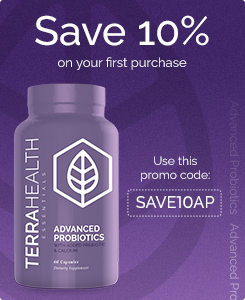Probiotics are one of the most commonly used supplement worldwide, but there are a lot of misconceptions about what this supplement is and what it does. So let’s get to work on clearing things up!
Firstly, what is a probiotic? Your gut contains a diverse microbiome made up of trillions of bacteria, both good and bad. A healthy gut is home to about 85% “good bacteria” and 15% of the bad guys. But when that balance goes out of whack, you’ll start to experience the symptoms of poor gut health such as bowel problems, bloating, acid reflux, indigestion, and stomach pains. It can even affect your immune system, mental health, and cause whole body inflammation.
If you’ve been thinking about adding a probiotic to your diet you’ve probably come across a LOT of information and it won’t all be factual. Luckily, you’ve come to the right place. We’ve been developing gut health products for over a decade and one of our best-selling products is our Advanced Probiotic, so we won’t steer you wrong!
Watch out for these 5 Common Myths About Probiotics
1. Probiotics Aren’t Very Effective
The catch-22 of probiotics being so recognized as a supplement is that many people think “hmm, but do they actually really do anything?”. The truth is that probiotics are one of the best supplements you can take for your overall health, in addition to increasing your intake of probiotic-rich foods. Increasing your probiotic intake will restore the natural balance of bacteria in the gut to avoid experiencing the symptoms outlined earlier in this post such as digestive problems and chronic inflammation.
2. You Can’t Take Probiotics When on Antibiotics
Most people know that probiotics are commonly recommended to take after a course of antibiotics (and if you didn’t, now you do!). This is because antibiotics work by killing the harmful bacteria in your gut but they wipe out the good bacteria in the process, and you need extra probiotics to build this back up. However, you don’t need to wait until you finish your antibiotics before starting your probiotic. In fact, you should start it as soon as possible!
3. If You Don’t Have Poor Digestion, You Don’t Need Probiotics
Probiotics have an extensive range of benefits for your digestive health but that’s not all! Your gut is actually known as your second brain thanks to the gut-brain axis which connects it with your “big brain”. This leads to a whole host of other probiotics benefits from boosting your good gut bacteria with probiotics, such as better mood and mental clarity, relief from skin conditions such as acne, and a stronger immune system.
4. You Can’t Take Probiotics During Pregnancy
This is a very common misconception that you may have come across! But the truth is that taking probiotics during pregnancy can be incredibly beneficial in helping you to deal with the pregnancy itself, maintaining a healthy immune system, and will ensure that you pass on a healthy diverse microbiome to your baby at birth! Research shows that the probiotics benefits of this healthy “starter microbiome” continue on to breastfeeding, should you choose to do so.
5. All Probiotics are Created Equal
If you’ve decided to try a probiotic and found yourself standing in front of a shelf wondering “but which one?!”, you’re not alone! There are a LOT of probiotics on the market, which isn’t surprising given how beneficial they are. However, this also means that the quality can vastly differ.
Here are a few things to look out for when choosing the probiotic that will deliver the most benefits:
- Look for a multi-strain probiotic rather than single-strain.
- Make sure it contains Bifidobacterium, Lactobacillus, Bacillus or Saccharomyces boulardii.
- A high number of CFUs (these are the alive and active microorganisms in each serving.) The minimum CFU count is 1 billion but you should really be looking for 7 billion+.
- A probiotic with added prebiotics is preferable as these feed the good bacteria in your gut.

